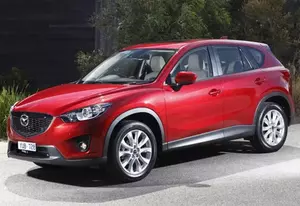
| Vehicle | Curb weight | Difference from world's smallest | Weight to power ratio | 0—60 mph acceleration ratio | Consumption ratio |
|---|---|---|---|---|---|
| 2.2 SKYACTIV-D |
1674 kg / 3691 lbs |
1249 kg (2754 lbs) heavier | 9 kg to 1 hp | 184 kg/s (406 lbs/s) |
299 kg/L (659 lbs/L) |
| 2.5 SKYACTIV-G |
1612 kg / 3554 lbs |
1187 kg (2617 lbs) heavier | 9 kg to 1 hp | - |
244 kg/L (538 lbs/L) |
| 2.0 SKYACTIV-G |
1515 kg / 3341 lbs |
1090 kg (2404 lbs) heavier | 9 kg to 1 hp | 147 kg/s (324 lbs/s) |
210 kg/L (463 lbs/L) |
| 2.5 Turbo SKYACTIV-G |
1656 kg / 3651 lbs |
1231 kg (2714 lbs) heavier | 7 kg to 1 hp | - |
227 kg/L (501 lbs/L) |
| Vehicle | 2.2 SKYACTIV-D |
|---|---|
| Curb weight |
1674 kg / 3691 lbs |
| Difference from world's smallest | 1249 kg (1249 lbs) heavier |
| Weight to power ratio | 9 kg to 1 hp |
| 0—60 mph acceleration ratio | 184 kg/s (406 lbs/s) |
| Consumption ratio |
299 kg/L (659 lbs/L) |
| Vehicle | 2.5 SKYACTIV-G |
| Curb weight |
1612 kg / 3554 lbs |
| Difference from world's smallest | 1187 kg (1187 lbs) heavier |
| Weight to power ratio | 9 kg to 1 hp |
| 0—60 mph acceleration ratio | - |
| Consumption ratio |
244 kg/L (538 lbs/L) |
| Vehicle | 2.0 SKYACTIV-G |
| Curb weight |
1515 kg / 3341 lbs |
| Difference from world's smallest | 1090 kg (1090 lbs) heavier |
| Weight to power ratio | 9 kg to 1 hp |
| 0—60 mph acceleration ratio | 147 kg/s (324 lbs/s) |
| Consumption ratio |
210 kg/L (463 lbs/L) |
| Vehicle | 2.5 Turbo SKYACTIV-G |
| Curb weight |
1656 kg / 3651 lbs |
| Difference from world's smallest | 1231 kg (1231 lbs) heavier |
| Weight to power ratio | 7 kg to 1 hp |
| 0—60 mph acceleration ratio | - |
| Consumption ratio |
227 kg/L (501 lbs/L) |

| Vehicle | Curb weight | Difference from world's smallest | Weight to power ratio | 0—60 mph acceleration ratio | Consumption ratio |
|---|---|---|---|---|---|
| 2.0i |
1405 kg / 3098 lbs |
980 kg (2161 lbs) heavier | 9 kg to 1 hp | 161 kg/s (355 lbs/s) |
213 kg/L (470 lbs/L) |
| 2.5i |
1440 kg / 3175 lbs |
1015 kg (2238 lbs) heavier | 8 kg to 1 hp | 189 kg/s (417 lbs/s) |
200 kg/L (441 lbs/L) |
| 2.2d |
1480 kg / 3263 lbs |
1055 kg (2326 lbs) heavier | 8 kg to 1 hp | 176 kg/s (388 lbs/s) |
285 kg/L (628 lbs/L) |
| Vehicle | 2.0i |
|---|---|
| Curb weight |
1405 kg / 3098 lbs |
| Difference from world's smallest | 980 kg (980 lbs) heavier |
| Weight to power ratio | 9 kg to 1 hp |
| 0—60 mph acceleration ratio | 161 kg/s (355 lbs/s) |
| Consumption ratio |
213 kg/L (470 lbs/L) |
| Vehicle | 2.5i |
| Curb weight |
1440 kg / 3175 lbs |
| Difference from world's smallest | 1015 kg (1015 lbs) heavier |
| Weight to power ratio | 8 kg to 1 hp |
| 0—60 mph acceleration ratio | 189 kg/s (417 lbs/s) |
| Consumption ratio |
200 kg/L (441 lbs/L) |
| Vehicle | 2.2d |
| Curb weight |
1480 kg / 3263 lbs |
| Difference from world's smallest | 1055 kg (1055 lbs) heavier |
| Weight to power ratio | 8 kg to 1 hp |
| 0—60 mph acceleration ratio | 176 kg/s (388 lbs/s) |
| Consumption ratio |
285 kg/L (628 lbs/L) |

| Vehicle | Curb weight | Difference from world's smallest | Weight to power ratio | 0—60 mph acceleration ratio | Consumption ratio |
|---|---|---|---|---|---|
| 2.0 |
1411 kg / 3111 lbs |
986 kg (2174 lbs) heavier | 9 kg to 1 hp | 162 kg/s (357 lbs/s) |
235 kg/L (518 lbs/L) |
| 2.2 |
1540 kg / 3396 lbs |
1115 kg (2459 lbs) heavier | 10 kg to 1 hp | 159 kg/s (351 lbs/s) |
280 kg/L (617 lbs/L) |
| Vehicle | 2.0 |
|---|---|
| Curb weight |
1411 kg / 3111 lbs |
| Difference from world's smallest | 986 kg (986 lbs) heavier |
| Weight to power ratio | 9 kg to 1 hp |
| 0—60 mph acceleration ratio | 162 kg/s (357 lbs/s) |
| Consumption ratio |
235 kg/L (518 lbs/L) |
| Vehicle | 2.2 |
| Curb weight |
1540 kg / 3396 lbs |
| Difference from world's smallest | 1115 kg (1115 lbs) heavier |
| Weight to power ratio | 10 kg to 1 hp |
| 0—60 mph acceleration ratio | 159 kg/s (351 lbs/s) |
| Consumption ratio |
280 kg/L (617 lbs/L) |